Drohi (1948 film)
Drohi (transl. The Traitor) is a 1948 Telugu-language drama film directed by L. V. Prasad.[1] This was the debut film for Pendyala Nageswara Rao as music director.[2]
| Drohi | |
|---|---|
 | |
| Directed by | L. V. Prasad |
| Produced by | K. S. Prakash Rao |
| Written by | Tapi Dharma Rao |
| Starring | G. Varalakshmi Lakshmirajyam K. S. Prakash Rao Kona Prabhakar Rao Kasturi Shiva Rao L. V. Prasad Rallabandi Kutumba Rao Surabhi Balasaraswati |
| Music by | Pendyala Nageshwara Rao |
| Cinematography | Sreedhar |
Release date | 10 December 1948 |
Running time | 179 minutes |
| Country | India |
| Language | Telugu |
The plot
Saroja (Varalakshmi), daughter of Zamindar Gangadhar Rao (Rallabandi), is an arrogant woman. She loves Raja Rao (Kona Prabhakar Rao), who assists her father in instituting wrong things. He accidentally kills an old man while driving her car. Dr. Prakash (Prakash Rao) provides shelter to his granddaughter Seetha (Lakshmirajyam). Seetha helps Dr. Prakash in his social service activities. Dr. Prakash marries Saroja. Since then she hates Seetha, harasses her and drives her from the hospital. Prakash continues his social service in the village with the help of Seetha. Knowing this, Gangadhar Rao, with the help of Raja Rao, sets village huts on fire. The angry villagers try to attack them. Seetha, with her kindness, convinces and stops them, but during her attempt, succumbs to bullet wounds. Saroja changes her mind and gets her father and Raja Rao arrested. She distributes her riches to the poor people.

Cast
- G. Varalakshmi as Saroja
- Lakshmirajyam as Seeta
- K. S. Prakash Rao as Dr. Prakash
- Rallabandi Kutumba Rao as Gangadhara Rao
- Kona Prabhakara Rao as Raja Rao
- L. V. Prasad
- Kasturi Siva Rao as Compounder
- Venkumamba
- Surabhi Balasaraswati
Songs
- "Aalakinchandi Babu Alakinchandi"
- "Chakkaligintalu Levaa Chakkani Oohalu Raavaa" (Lyrics: Tapi Dharma Rao; Singer: G. Varalakshmi)
- "Endukee Bratuku" (Lyrics: Tapi Dharma Rao; Singer: K. Jamuna Rani)
- "Idenaa Nee Nyayamu" (Lyrics: Tapi Dharma Rao; Singer: M. S. Ramarao)
- "Poovu Cheri Palumaaru Tiruguchu Paata Paadunadi Emo" (Lyrics: Tapi Dharma Rao; Singers: Ghantasala and G. Varalakshmi)
1970 film
The film Drohi was also made in 1970, directed by K. Bapaiah and starring Kongara Jaggaiah, Vanisree and S. Varalakshmi.[3]
References
- Naati 101 Chitralu, S. V. Rama Rao, Kinnera Publications, Hyderabad, 2006, pp.38-39.
- Narasimham, M. L. (5 August 2012). "Drohi (1948)". The Hindu. Archived from the original on 3 February 2020. Retrieved 3 February 2020.
- https://www.imdb.com/title/tt0154430/